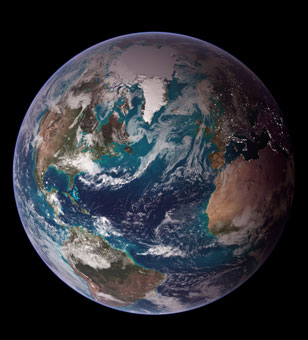
The Discipline of Tending to Our Own Planet
We live in a vast universe made up of billions of galaxies, each of which is made up of billions of stars. Our home is a small planet that revolves around a small sun in a remote galaxy. It is just the right distance from the sun so that it is not too hot or too cold to support life. It has air that is breathable, water that is drinkable and topsoil suitable for growing crops. In the immensity of space, it is a very small dot, what astrophysicist Carl Sagan referred to as a "pale blue dot." Our Earth is the only place we know of that harbors life. It is precious beyond any riches that could be imagined.
One would think that any sane, self-reflecting creatures that lived on this planet would recognize its beauty and preciousness and would want to tend to it with care. In Antoine de Saint-Exupéry's classic book, "The Little Prince," the prince says: "It's a matter of discipline. When you've finished washing and dressing each morning, you must tend to your planet." But that is an imaginary planet with an imaginary little prince. On the real planet that supports life, the one we inhabit, there aren't enough of us who exercise such discipline and tend to our planet with loving care.
Think about how we have managed our planet. We have allowed the planet to become divided into rich and poor, where a few people have billions of dollars and billions of people have few dollars. While some live in greed, the majority live in need. We have parceled the planet into entities we call countries and created borders that countries try to protect. We have created military forces in these countries and given them enormous resources to prepare for war and to engage in war. Annual global military expenditures now exceed $1.6 trillion, while hundreds of millions of humans live without clean water, adequate nutrition, medical care and education.
 (Photo: NASA/Goddard Space Flight Center/Reto Stöckli)
(Photo: NASA/Goddard Space Flight Center/Reto Stöckli)
We have eagerly exploited the planet's resources with little concern for future generations or for the damage we cause to the environment. Instead of using renewable energy from the sun to provide our energy needs, we exploit the Earth's stores of oil and transport them across the globe. We have turned much of the world into desert. We have polluted the air we breathe and the water we drink. In our excess, we have pushed the planet toward the point of no return in global warming and then argued global warming as a reason to build more nuclear power plants.
We keep relearning, in tragic ways, that we humans are fallible creatures. That is the lesson of our recurrent oil spills. It is also the lesson of the accidents at Chernobyl a quarter century ago and at Fukushima one year ago. It is a lesson that we urgently need to learn about nuclear weapons - weapons we have come close to accidentally using on many occasions and have twice used intentionally.
Nuclear weapons kill directly by blast, fire and radiation. The nuclear weapons used at Hiroshima and Nagasaki were small in comparison with today's thermonuclear weapons. In recent years, we have learned some new things about nuclear war. Atmospheric scientists have modeled a hypothetical nuclear war between India and Pakistan in which each side uses 50 Hiroshima-size nuclear weapons on the other side's cities. In addition to the direct effects of the weapons, there would be significant indirect effects on the environment. Smoke from the burning cities would rise into the stratosphere and reduce warming sunlight for ten years, which would lower average surface temperatures, reduce growing seasons and lead to global famine that could kill hundreds of millions of people.
That would be the result of a small nuclear war, using less than one percent of the operationally deployed nuclear weapons on the planet. A nuclear war between the United States and Russia could lead to the extinction of most or all complex life on Earth, including human life. As we celebrate Earth Day this year, 20 years after the end of the cold war, both the United States and Russia maintain hundreds of launch-ready, land-based intercontinental ballistic missiles on high-alert status, ready to be fired in moments.
We who are alive today are the trustees of this planet for future generations. We're failing in our responsibility to pass it on intact. We need a new Earth ethic that embraces our responsibility for fairness to each other and to the future. We need new ways of educating that do not simply accept the status quo. We need to trade in our patriotism for a global humatriotism. We need a new approach to economics based on what is truly precious - life and the conditions that support it.
Earth Day will have its greatest value if it reminds us to care for our Earth and each other all the other days of the year, individually and through our public policy. We need to inspire people throughout the world, young and old alike, with a vision of the beauty and wonder of the Earth that we can now enjoy, restore and preserve for future generations if we tend to our planet with the discipline of the little prince.
This article is a Truthout original.
David Krieger
David Krieger is president of the Nuclear Age Peace Foundation, an organization that has worked since 1982 for peace and the abolition of nuclear weapons.
